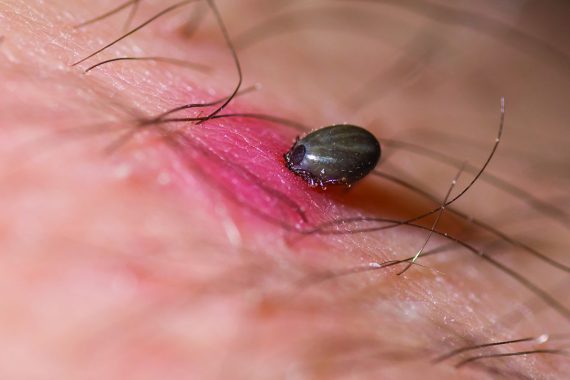Tick-bite patients advised to see GP if unwell after TBE detected in UK

Tick-borne encephalitis is now present in the UK public health officials have warned with individuals being advised to see their GP if they become unwell after a tick bite.
The UK Health Security Agency said there have been three cases of probable or confirmed tick-borne encephalitis (TBE) acquired in England since 2019, including one in Yorkshire in 2022.
A new risk assessment from the joint Human Animal Infections and Risk Surveillance group has concluded while the risk to the general public remains very low, the virus is now likely to be present in the country.
In July 2019, a European visitor became ill after being bitten by a tick in the New Forest, Hampshire, and was diagnosed as a highly probable case of TBE.
The following year, a second probable case of TBE infection was diagnosed in a patient from Hampshire.
A third case was reported in England in September 2022, who is likely to have acquired infection in Scotland in June 2022. A fourth case was reported in England in October 2022, after a visit to the North Yorkshire Moors.
The virus has also detected previously in the Hampshire and Dorset, and Norfolk and Suffolk border areas but may also be present elsewhere as the tick species that carries the virus is widespread in the UK, the report said.
TBE is common around the world, including many countries in Europe, and can cause everything from completely asymptomatic infection to mild flu-like illness as well as severe infection in the central nervous system such as meningitis or encephalitis.
Symptoms of more severe disease are similar to other causes of meningitis, and can include a high fever with headache, neck stiffness, confusion or reduced consciousness.
Experts are still investigating why the virus has been found in ticks more frequently in recent years but it is likely there are several factors at play.
Surveillance is being done of tick and mosquito species and their distribution, and the infections that they carry, to understand more about emerging infections in this country, UKHSA said.
As well as seeking medical advice if they have any symptoms of meningitis, the public is also being urged to check themselves for ticks after they have been outdoors and remove them promptly and correctly, noting they can also carry Lyme disease.
Hospitals have been advised to increase testing for TBE when patients have related symptoms and it should be considered where epidemiological risk exists (forest exposure or tick bites or there is no clear alternative diagnosis but compatible illness.
Dr Meera Chand, deputy director at UKHSA, said: ‘Our surveillance suggests that tick-borne encephalitis virus is very uncommon in the UK and that the risk to the general population is very low.
‘Ticks also carry various other infections, including Lyme disease, so take steps to reduce your chances of being bitten when outdoors in areas where ticks thrive, such as moorlands and woodlands, and remember to check for ticks and remove them promptly.’
Visit Pulse Reference for details on 140 symptoms, including easily searchable symptoms and categories, offering you a free platform to check symptoms and receive potential diagnoses during consultations.
Related Articles
READERS' COMMENTS [1]
Please note, only GPs are permitted to add comments to articles










‘A fourth case was reported in England in October 2022, after a visit to the North Yorkshire Moors.’
That’s four cases in 65 million people (plus the millions of tourists). One can’t be too careful! More people are seriously injured falling downstairs, so isn’t it time to ban stairs or at least put a health warning on them?